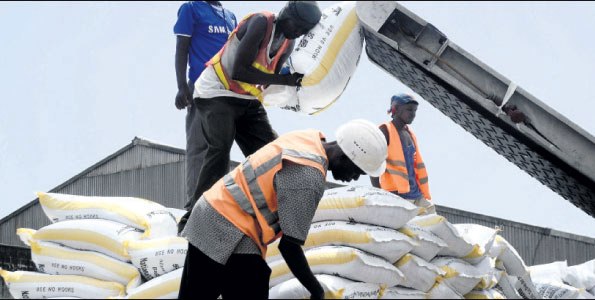
Fertiliser being offloaded at the Port of Mombasa. Information gap is hindering access to subsidised fertiliser. Photo by Business Daily.
Despite the government spending more than Sh20 billion in importation of over half a million tonnes of fertiliser for subsidy for about four years to spur productivity, farmers are unfamiliar with the intricate process of accessing the cheaper input as they remain targets of middlemen exploiting the information gap.
From the use of the local administrators like chiefs in profiling farmers in respect to need to the introduction of the electronic subsidy management system, the distribution of the fertiliser has remained unreachable for the deserving people since its launch in 2013.
The Ministry of Agriculture Cabinet Secretary Willy Bett in March this year blamed the extensive vetting process of farmers before accessing the cheaper input from the nearest National Cereals and Produce Board (NCPB) depot. He insisted that vetting is key to root out cheats.
Subsidised DAP fertiliser is sold at Sh1,800 per bag of 50 kilogrammes. Private agro-dealers are selling the same fertiliser at between Sh2,700 and Sh3,200 depending on the place. The fertiliser is mainly distributed ahead of the planting season. Other fertilisers such as urea and CAN have different selling prices under the subsidy.
“Some businessmen posing as farmers are getting the fertiliser to resell. That is what we want to do away with (in the vetting process),” the minister said.
With the application of the quota, the NBPB releases only 40 bags per farmer.
But Patrick Njenga, a farmer in Kiambu County, received one out of the five bags he applied for in March this year. And he paid Sh2,300 to the ‘appointed agent’ after delivery to his Kimende farm.
Njenga said giving farmers less than they requested for still exposes them to the cartels, who may be running parallel businesses with insiders on the subsidised input.
After a telephony supported pilot project, the government announced last year that the farmers are required to register online through the electronic management system with their telephone numbers to access the fertiliser.
After an online vetting, they fill their details into the database to receive a unique code, which they use to access the commodity. Allocation is pegged on the profile of the farmer in the database.
The Safaricom Limited Company’s system allow for farmers to place requests and after receiving the input, they can be tracked to limit reselling.
The management module also captures the input suppliers countrywide with a timely show of stocks available in the various outlets for quick action in case of an anticipated depletion.
Registration is done via the Ministry of Agriculture’s e-services portal. After the farmer has entered their telephone number, they receive a password via short message service for logging in.
Ezekiel Ndege, another farmer from Nyamira County, said the online system is little known by the small-holders, leaving a gap for the ‘elite farmers’ to amass as much as possible to resell. Besides, the tracking system may not be fool-proof after the farmer has got the input.
“If the government estimates that 10,000 farmers in Nyamira County are to benefit from 100,000 bags, and only 500 apply for 10,000 bags through the online system, the remaining is prone to abuse as the elites will apply for more, which they resell at higher prices,” he said.
This also happens to farmers who are far away from the appointed distribution points as they prefer buying expensively from local private suppliers than incurring transportation costs from an NCPB that is 50km away.
READ ALSO: Rabbit urine cuts pesticide and fertiliser costs
READ ALSO: Excess fertiliser application may cut by half farmer's crop harvest
READ ALSO: New Amiran Kenya and Yara fertiliser triples vegetable harvests
Although maize was the initial crop targeted by the programme, more other crops such as tea and sugarcane are being included. DAP is often given during the planting season, with maize being grown from the beginning of very year to around April depending on the rains.
Kenya has reached an average of 20 kilogrammes of fertiliser per acre against the global recommended application rate of 54 kilogrammes over the same piece of land. This is higher than the Sub-Saharan Africa average application rate of seven kilos per acre.
Apart from the fertiliser, other inputs like seeds can be bought at subsidised prices at the designated outlets like the State-owned Kenya Seed Company Limited shops.
















Comments powered by CComment